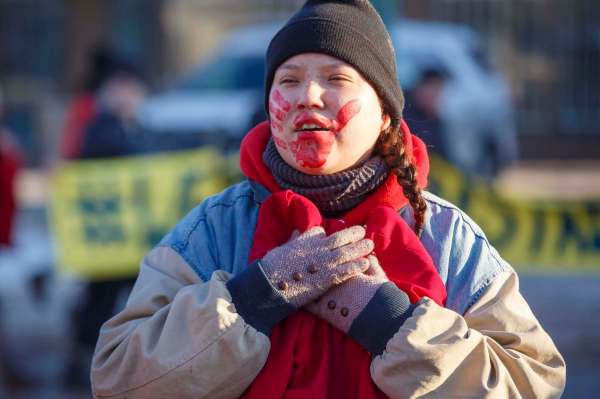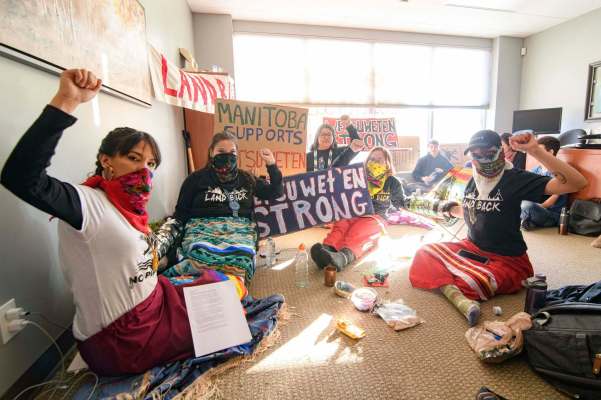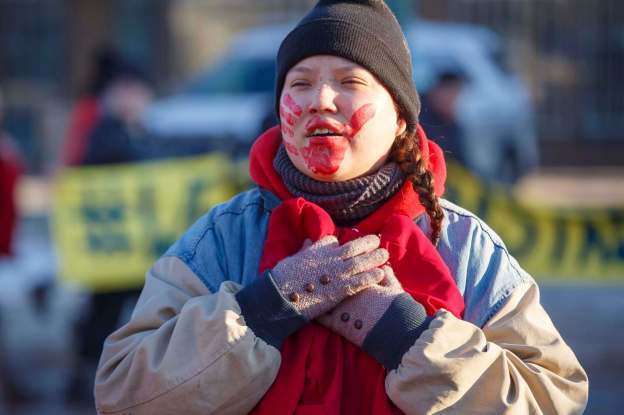Escalating confrontation in name of reconciliation

Emily Amos, a member of Indigenous Youth for Wet’suwet’en, sings during a protest held in solidarity with the Wet’suwet’en in British Columbia at Portage Avenue and Dominion Street in front of RCMP ‘D’ Division Headquarters in Winnipeg on Feb. 24. MIKE DEAL / WINNIPEG FREE PRESS
By: Dylan Robertson, Winnipeg Free Press
Harrison Powder recalls the look of hate in a truck driver’s eyes as the tractor-trailer lurched towards a group of Indigenous protesters south of Morris.
In February, protests in solidarity with Wet’suwet’en pipeline opposition in B.C. were strangling Canada’s key supply routes, with demonstrators across the country blockading railways and main roads.
On Highway 75, two protesters holding flags stood in the middle of the road. An approaching semi-truck slowed down, but then swerved around the pair, gaining speed as it briefly pointed towards a group of elders and children.
“(The driver) was mad; he was swearing at us. There was this underlying tone of racism,” said Powder.
He jumped out from the group, standing squarely in front of the truck’s right tire. He jumped back in the nick of time.
“If I had slipped on ice, he would have ran right over me.”
This past winter, long-simmering grievances about broken treaty promises had boiled over. Protesters occupied Winnipeg MP Dan Vandal’s constituency office for 11 days, while railway blockades from Headingley to Halifax united under the hashtag #ShutDownCanada.
The disruption caused Quebec hospitals to start rationing propane and put the minority Liberal government on the back foot, with Prime Minister Justin Trudeau cancelling at the last minute a meticulously planned diplomatic trip to the Caribbean.
The pressure mounted right up until COVID-19 suddenly dominated the public’s attention in March.
The protests continued during the pandemic.
At the site of the Keeyask generating station megaproject, four Cree bands are nominally partners with Manitoba Hydro. They felt compelled to blockade the site’s access roads in May, as they felt the Crown corporation’s pandemic protocols did not address safety concerns.
This fall, Mi’kmaq fishers asserting their right to harvest lobster faced angry mobs and suspected arson in Nova Scotia.
“We’re not out there because we want to; we’re forced to be out there,” said Powder. “It’s the only time people pay attention.”
Indigenous rights protests aren’t new; many Canadians recall tense moments and tragedies during the Ipperwash and Oka crises.
Yet, the blockades and protests seem to be taking on an increased appeal. Indigenous people are younger than the general population, and they’re demanding Canada stop contributing to climate change, which threatens their traditions and connection with the land.
“We’re really understanding the true loss that we will have if we don’t fight,” said Victoria Redsun, a Winnipeg activist who was arrested in February at the epicentre of the Wet’suwet’en protest in northern British Columbia.
That dispute surrounds a court injunction to allow construction of a natural-gas pipeline. Bands elected under the colonial Indian Act supported the project, but it was opposed by clans with a hereditary leadership system that dates to before colonization.

Mike Sudoma / Winnipeg Free Press Files A group of protesters supporting the Wet’suwet’en perform a sit in along with other allies at Minister of Foreign Affairs, Dan Vandal’s office on Feb. 4. Mike Sudoma / Winnipeg Free Press Files.
It thrust questions about who speaks for Indigenous people out of stuffy legal precedents and onto the streets of Canadian cities.
“It’s going to continue escalating,” Redsun said in a call this month from Wet’suwet’en territory. Those braving the harsh winter want sustainability to trump resource extraction and profits for industry.
“What we’re asking for means their complete disruption, and the complete dismantling of the systems that be.”
Redsun, 21, grew up at in Manitoba’s far North at Northlands Denesuline First Nation. She visited the community this summer, and felt troubled to hear of lakes freezing late, and unpredictable caribou harvests.
“Even though I’m so far out from any civilization, I’m still going to be affected by capitalism and colonialism, which are creating global warming,” she said.
Redsun is buoyed by images of large protests that show Canadians of all origins rallying for societal change. Many of those came out for the 2019 climate marches appeared at Indigenous rights rallies last winter, and protests for racial justice this summer.
“I think for the first time in history we’re going to see real change.”
For that to happen, Powder says governments need to uphold the treaties that pledged equity and co-operation.
“These were words of promise, from your nation to our nation. And we want those promises kept,” he said. “If those things were done, Indigenous resistance movements wouldn’t be necessary.”
Yet, Canadian governments are on a collision course on how best to avoid disruptive protests.
Last month, the Manitoba government led by Premier Brian Pallister reissued a spring notice that it intends to pass a bill to ban blocking critical infrastructure, such as railways and dams.
Meanwhile, the Trudeau government is proceeding with another attempt to get the United Nations Declaration on the Rights of Indigenous Peoples enshrined in Canadian law, which will require Indigenous consent for major projects and pipelines.
Vandal, the federal minister of northern affairs, had his St. Boniface constituency office occupied in February, which he says feels like a lifetime ago.
He feels the Liberals have made real progress by including Indigenous leaders in legislation meant to restore their autonomy, and putting up millions to start bridging decades-old gaps.
“There’s so much work to do because past governments, including some Liberal governments, have not invested what they should have, in partnership with Indigenous nations. So the gap is so large that it’s going to take decades to catch up,” Vandal said.
“Reconciliation is a process; there’s going to be no end point.”
That progress isn’t moving fast enough for Powder, but he says it’s a better approach than ignoring Indigenous people’s concerns and then arresting them for blocking a road.
“We’re not here to invade your territories or take anything from you; we’re on the receiving end of that,” he said.
“We’re pretty forgiving. We all want reconciliation in some form. But the only way to get there is to understand that we have rights, as the first peoples of this land.”
dylan.robertson@freepress.mb.ca
Winnipeg Free Press, Posted: 12/31/2020.










